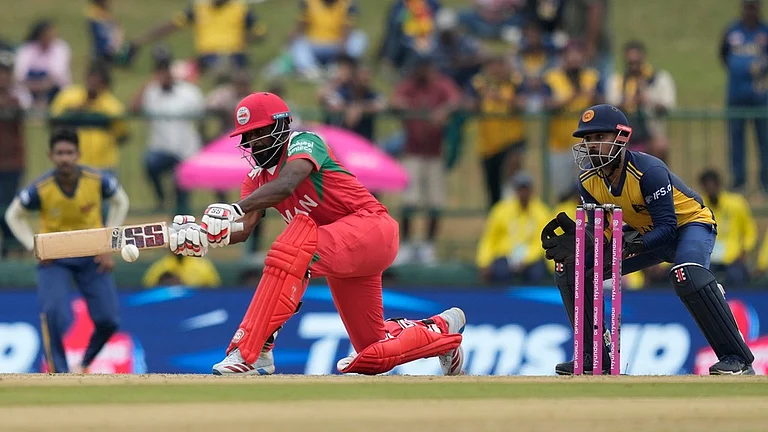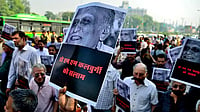Imtiyaz Ahmed, 35, doesn’t have a faintest idea as to when his ancestors made the sprawling Yousmarg pasture in Kashmir’s Badgam district their home. His neighbors, also traditional forest dwellers, are equally ignorant. But the local tourism development authority, which came into existence only a few years ago, has prohibited them from repairing their homes made of mud, stone and wood. Worried about their dilapidated shelters, they fear that they may soon be rendered homeless after the worn-out structures collapse.
“Where will we go if our houses collapse? We have been denied permission to change the old and decaying wooden logs or rebuild our houses,” Imtiyaz tells Outlook. “The tourism authority wants us to leave this place.”

According to them, when Gulmarg and Sonamarg in the valley and Patnitop in Jammu region made it to the tourism map, all the local forest dwellers, mainly Gujjars and Bakarwals, were driven out almost similarly. The twin tribal communities constitute 11.9 percent of Jammu and Kashmir’s total population, as per Census 2011.
The revocation of Articles 370 and 35 A had paved way for the implementation of two significant central legislations — The Scheduled Tribes and Other Traditional Forest Dwellers (Recognition of Forest Rights) Act, 2006, also called Forest Rights Act, and the Scheduled Castes and the Scheduled Tribes (Prevention of Atrocities) Amendment Act. Though the delimitation commission has recently reserved at least nine assembly seats for tribal communities in the union territory assembly, several new challenges have started to threaten their traditional way of life.
These socially and economically most marginalized pastoral communities in Jammu and Kashmir are viewed as Muslims in the Hindu-majority Jammu division, whereas they are ethnically isolated in Kashmir. The tribal groups of Gujjars and Bakarwals were classified as Scheduled Tribe in 1991 along with Gaddi and Sippi communities, a small Hindu tribal minority in Jammu region. But the fruits of reservation have largely been cornered by a small section of privileged community members so far.
Tribal rights
The FRA recognises the rights of forest dwelling STs and other forest dwellers on forest land. It defines forest dwelling STs as those who “primarily reside in and who depend on the forests or forest lands for bona fide livelihood needs”. It further defines other forest dwellers as “any member or community who has for at least three generations prior to the December 13, 2005 primarily resided in and who depend on the forest or forest land for bona fide livelihood needs.” Before the enactment of the FRA, forest dwellers were considered to be illegal encroachers on forest land. The FRA corrected this historical injustice as it says that no member of a forest dwelling ST or other traditional forest dwellers “shall be evicted or removed from the forest land” under their occupation without a recognition of their rights. It also entitles them due compensation in case of displacement.
In September 2021, the Rajouri district administration was awarded for its stellar role in FRA implementation after clearing 408 claims on forest land. According to sources, very little progress has been made since then. “Till May 31, 2022, only 2300 claims had been settled by the authorities under FRA across the union territory. And most of these cases fall under the community rights category that recognises their collective rights on common grazing lands, religious places and water resources,” says, Javid Rahi, secretary of the Tribal Research and Cultural Foundation, a frontal organisation working for tribal rights in Jammu and Kashmir. He underlines that settlement of individual claims has been negligible.
The implementation of the SC/ST Act seems even more disappointing. “Unlike Scheduled Caste community, the tribal communities haven’t filed even a single case under the Act so far owing to illiteracy and lack of awareness,” Rahi says. Significantly, as per Census 2011, only 17.8 per cent of the population from the tribal communities of Gujjars and Bakarwals can read and write to some extent.
While most of the forests have been fenced in with no access to tribal communities, the new government infrastructure has deepened the crisis. For example, several colleges, universities and even the All India Institute of Medical Sciences (AIIMS) Jammu stand on the land that once belonged to these communities. Tribal communities in several areas have been debarred from using grazing land that the Dogra Maharajas had allotted them. Because of such reasons, the communities have been demanding a law prohibiting the use of grazing land for other purposes.
At least 40 tribal families in Poonch district’s Nakka Manjhri and Karnah Parat have stopped summer migration to the highland pastures like Panjhtari in the Pirpanjal range on Rajouri-Poonch border since 2005. “Our dhoks (pastures) are under army’s occupation. We are not even getting any rent or financial compensation from the government,” said Qamar Din, 65, a resident of Nakka Majhari.
Demolition drives
Earlier this year, several houses of Gujjar Bakerwal tribe families in Roop Nagar area on the periphery of Jammu city were demolished by the Jammu Development Authority (JDA) in a drive against what it billed as illegal encroachments. The aggrieved families claim that they had been living there for decades.
Such drives intensified in 2020 when show cause notices to evict forest-dwelling communities came following directions of the Jammu and Kashmir High Court.
On October 9, 2020, the court directed that the government land “which was in illegal and unauthorized occupation” be compiled and posted on an official website, “with full identity of encroachers.”
Eventually, the police, forest and wildlife protection departments besides several development authorities swung into action and several dwellings of the tribal communities were demolished in Kashmir as well as Jammu.
“Tribal community members lack legal awareness. Over 80 percent of the tribal population doesn’t know about the laws that protect their land and property rights,” senior advocate Shah Mohammad Choudhary tells Outlook, adding, “The entire government machinery has been dispossessing the traditional forest dwellers in violation of the laws that provide them safeguards.”
Choudhary alleges that the supervisory committees constituted for the implementation of the FRA and the Scheduled Castes and the Scheduled Tribes (Prevention of Atrocities) Amendment Act were neither holding their routine meetings nor working as per the provisions of the law. He says that he would soon move the Supreme Court over violation of the tribal rights. He has filed a writ petition in the J&K High Court to halt the proposed construction of new high court building in the Raika-Bahu forest land on the periphery of Jammu city. “Several tribal families have been living there for more than 150 years. And the government wants to demolish their homes and throw them out,” he says, lambasting UT administration over demolition of tribal houses in the recent months.
Migration challenges
Due to the ongoing border conflict and spread of militancy, tribal communities have no access to the north-west highlands of Kashmir like Gurez and Kargil, as well as traditional migration routes along the disputed border with Pakistan called LoC in Jammu region. At alternative pastures like Dachigam, the habitat of the UT’s national animal Hangul or Kashmir stag, they are being targeted by the wildlife department.
Worsening climate stresses have also threatened their pastoral nomadic lifestyle. On October 23, three members of a nomadic tribal family were killed after their tent was swallowed up by a mudslide triggered by torrential rains in Pulwama district’s Noorpora village. In a separate incident in January 2020, two Bakarwal kids, Sahil Zubair, 10, and Shazia,6, died of extreme cold in South Kashmir’s Kulgam district.

Mohammad Pervez, 25, tells how his family had lost an entire flock of over 150 sheep and goats when it was struck by a thunderbolt in Rajouri district in May 2020. At present, his family puts up in a tent on the right bank of a small stream near Panjanpul bridge in Anantnag. “The local administration gave us some money as immediate financial relief but it didn’t compensate even one-fourth of our loss,” he tells Outlook, adding that the family has taken to menial jobs for sustenance.
Nomadic tribal families are also facing growing opposition from local communities on the migration route that have come up due to expansion of towns, villages and farms. They have also been facing boycott calls since Kathua rape case agitation. The crisis only deepened during the Covid pandemic.
Rapidly growing vehicular traffic also poses a formidable challenge to the seasonal migration of pastoral nomadic families. On October 12 last year, a speedy vehicle mowed down a flock of 20 sheep of a nomad on Poonch-Jammu highway near Bhambla in Reasi district. Nomadic tribal families rarely get compensated for such losses.
Bashir Gujjar encountered a peculiar situation last month. On way to Kashmir from his winter home in Jammu, he along with his family was detained at police station Nagrota. Their offence: A newly born calf in the herd had made addition to the headcount mentioned in the 'Permit' given by the local administration. Almost 18 hour later, the caravan was allowed to proceed only after the matter was brought to higher authorities’ notice.
Police cases
Another section of the twin tribal community, Dodhi Gujjars — which mostly migrates within the Jammu region — is largely dependent on milk-yielding animals. They also find themselves locked in conflict with the local communities and allege persecution at the hands of local police and forest officials. In a written representation to the Lt. Governor Manoj Sinha, residents of the tribal Bastis at Rajpura Mandi and Rajpura camp, which sit at the International Border with Pakistan in Akhnoor sector, highlighted several burning issues. “The forest department officials regularly visit our Bastis and harass the community members. They are not ready to listen to our point of view that we have a claim over the forest land under FRA. They are not allowing cattle rearing and grazing in the area,” screamed the letter dated August 24, 2021, claiming that they had video recorded police and forest officials harassing them. Asserting that their properties are being destroyed illegally, the letter demanded that the erring officials be punished under SC/ST Atrocities Act.

Though the community members are dairy farmers, the forest officials have set up a fence along Rajpura Mandi Basti, blocking their access to the nearby canal. “Now we have to take a long detour to drive cattle to the canal. It becomes extremely difficult for the baby buffalos and sick cattle,” rues Fareed Choudhary, 35, while deploring that the Forest Rights Committees were not framed as per the FRA guidelines. A Gram Sabha is required to frame a committee comprising 10 members of the tribal communities and five women. “This aspect has been completely ignored,” he says, stressing that the local committee must have adequate tribal representation.
While the office of Lt. Governor is yet to respond to the letter, the community members have also demanded that police FIRs against residents of both the Bastis be withdrawn without any further delay. “Even our women folk were detained by police last year on charges of encroaching upon the State land,” Choudhary resents, adding, “At present, no one is paying heed to our daily problems. The local Gram Sabha is not accepting our claims under FRA. Local administration humare saath dangar-janwar wala bartaav kar rahi hai. (The local administration is treating us like stray cattle).”
(Some names have been changed to protect their identity.)


























